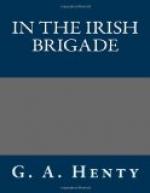As large French reinforcements were known to be approaching the frontier, and Philip’s army was already much superior in numbers to that of the allies, it was decided, in a council of war, to evacuate Madrid. The forces which had occupied Toledo and other towns were recalled, and, early in December, the army left the capital; the archduke riding at once to Barcelona, while the army, of which Stanhope’s division formed the rear guard, followed in the same direction.
The movement had been delayed too long. Vendome and Philip were already at hand, and on the 9th fell upon Stanhope’s division at Brihuega. This force, consisting of eight English battalions and the same number of Portuguese horse, defended themselves desperately, and although the town was wholly without fortifications, they repulsed every attack until their ammunition was exhausted, and they were then forced to surrender. Staremberg, on hearing that Stanhope was attacked and surrounded, turned back and marched with all speed to relieve him, but on arriving within three hours’ march of the town, heard that he had surrendered.
The Duke of Vendome, hearing of his coming, drew his troops out and formed them in line of battle, and the next morning attacked him vigorously. The allied right held their ground, but the left fled, and Vendome swept his right round and took the centre and right of the allies in the rear. Three battalions of the second line, however, fell in turn upon the French rear and repulsed them, and the left wing, rallying again, renewed the battle.
The combat was indecisive, both parties claiming the victory. Staremberg wrote to Charles that he had captured all the enemy’s guns, and had killed six thousand of them; while the French claimed that they had totally defeated the allies, and captured all their cannon, killed four thousand, and taken nine thousand prisoners. The balance of probability lies to some extent with the French, for the day after the battle, Staremberg retired and marched to Barcelona; but the fact that he was not at once pursued shows that the French and Spaniards must have suffered very heavily.
Desmond had passed unscathed through the battle of Saragossa. O’Neil had been severely wounded, but had managed to sit his horse until the division effected its junction with the Marquis de Bay’s shattered forces. Great was the wrath among the two Irish regiments at the issue of the battle.
“What is the use,” an officer said to Desmond, “of our throwing away our lives, fighting for these Spaniards, when they themselves are useless, save when they meet the Portuguese, who are still more contemptible? Here have we, on level ground, fairly beaten the enemy, while the right and centre, although having a great advantage in position, allow themselves to be scattered like a flock of sheep.”
“They had stouter foes to meet than we had,” Desmond said. “We had only Spaniards opposed to us, while they had English and Dutch to fight; and as the best French troops have found, in Flanders, that these were at least a match for them, we must not blame the Spanish too severely for giving way before they were attacked.”




